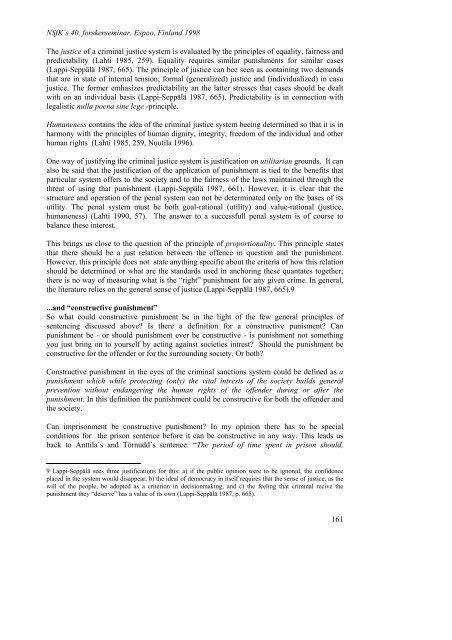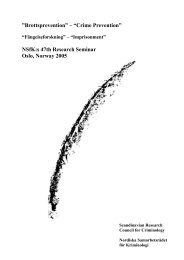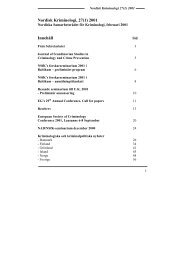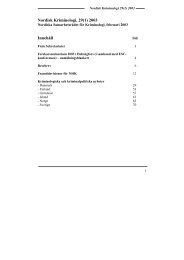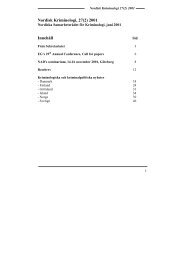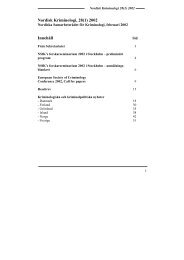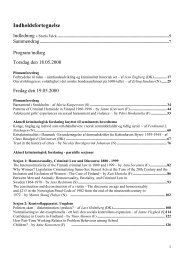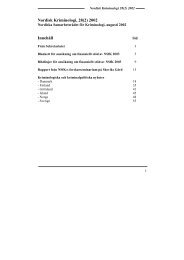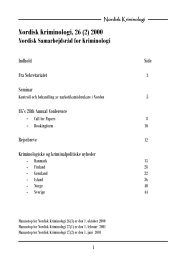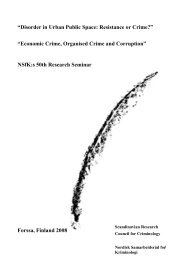Organised Crime & Crime Prevention - what works? - Scandinavian ...
Organised Crime & Crime Prevention - what works? - Scandinavian ...
Organised Crime & Crime Prevention - what works? - Scandinavian ...
You also want an ePaper? Increase the reach of your titles
YUMPU automatically turns print PDFs into web optimized ePapers that Google loves.
NSfK´s 40. forskerseminar, Espoo, Finland 1998<br />
The justice of a criminal justice system is evaluated by the principles of equality, fairness and<br />
predictability (Lahti 1985, 259). Equality requires similar punishments for similar cases<br />
(Lappi-Seppälä 1987, 665). The principle of justice can bee seen as containing two demands<br />
that are in state of internal tension; formal (generalized) justice and (individualized) in casu<br />
justice. The former emhasizes predictability an the latter stresses that cases should be dealt<br />
with on an individual basis (Lappi-Seppälä 1987, 665). Predictability is in connection with<br />
legalistic nulla poena sine lege -principle.<br />
Humaneness contains the idea of the criminal justice system beeing determined so that it is in<br />
harmony with the principles of human dignity, integrity, freedom of the individual and other<br />
human rights (Lahti 1985, 259, Nuutila 1996).<br />
One way of justifying the criminal justice system is justification on utilitarian grounds. It can<br />
also be said that the justification of the application of punishment is tied to the benefits that<br />
particular system offers to the society and to the fairness of the laws maintained through the<br />
threat of using that punishment (Lappi-Seppälä 1987, 661). However, it is clear that the<br />
structure and operation of the penal system can not be determinated only on the bases of its<br />
utility. The penal system must be both goal-rational (utility) and value-rational (justice,<br />
humaneness) (Lahti 1990, 57). The answer to a successfull penal system is of course to<br />
balance these interest.<br />
This brings us close to the question of the principle of proportionality. This principle states<br />
that there should be a just relation between the offence in question and the punishment.<br />
However, this principle does not state anything specific about the criteria of how this relation<br />
should be determined or <strong>what</strong> are the standards used in anchoring these quantates together;<br />
there is no way of measuring <strong>what</strong> is the “right” punishment for any given crime. In general,<br />
the literature relies on the general sense of justice (Lappi-Seppälä 1987, 665).9<br />
...and “constructive punishment”<br />
So <strong>what</strong> could constructive punishment be in the light of the few general principles of<br />
sentencing discussed above? Is there a definition for a constructive punisment? Can<br />
punishment be - or should punishment ever be constructive - is punishment not something<br />
you just bring on to yourself by acting against societies intrest? Should the punishment be<br />
constructive for the offender or for the surrounding society. Or both?<br />
Constructive punishment in the eyes of the criminal sanctions system could be defined as a<br />
punishment which while protecting (only) the vital intrests of the society builds general<br />
prevention without endangering the human rights of the offender during or after the<br />
punishment. In this definition the punishment could be constructive for both the offender and<br />
the society.<br />
Can imprisonment be constructive punishment? In my opinion there has to be special<br />
conditions for the prison sentence before it can be constructive in any way. This leads us<br />
back to Anttila`s and Törnudd´s sentence: “The period of time spent in prison should,<br />
9 Lappi-Seppälä sees three justifications for this: a) if the public opinion were to be ignored, the confidence<br />
placed in the system would disappear, b) the ideal of democracy in itself requires that the sense of justice, as the<br />
will of the people, be adopted as a criterion in decisionmaking, and c) the feeling that criminal recive the<br />
punishment they “deserve” has a value of its own (Lappi-Seppälä 1987, p. 665).<br />
161


